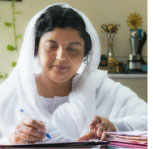Focus on Holistic Education in NEP 2020
NEP 2020 has laid transformative ideas to reshape education. Teachers are central to the success of our education system. Four years Bachelors in Education has got the long-awaited recognition and so has the amount of teaching practice in class room (30-40%) thus endeavouring to bridge the gap between knowledge and practice (hands on).
Creating ecosystem for educators & learners to excel by – much has been drafted & envisioned.
Integration spirit of human values in our curriculum i.e. K.G. to P hd. needs to be strengthened. Gurukul model or system of education i.e. blend of modern scientific education with spiritual rejuvenation is the need of the times.
These are the two core areas around which the universities of Nalanda & Taxila were built – pioneer work of Indian Civilization dating back to 1100 BC. These Vedic models of excellence started as centers of theology, where the spirit of philanthropy and humanity was the nucleus. Their edifice was so strong that Ivy league universities of today/ Cambridge/ Oxford emulated these models of excellence of Vedic period to develop the coveted model of pedagogical excellence & trans-disciplinary research.
NEP envisions a move from inspectorial regime of input focus, qualification on paper, to more dynamic, vibrant system of learning outcomes and pedagogy which requires teachers to be facilitators in the classroom versus ‘sage on stage’.
It emphasizes educational models which require us to re-invent ourselves and realign with rapid changes occurring in the world today. Be it climate change, machine learning, AI, Covid arises and more. Our learner has to be sensitized to the pain and suffering of millions around him. He has to develop the ability to ADAPT to these changes. This will be tested throughout his life and it is not buried in mere degrees and certificates stacked neatly in files. We have to teach our teachers to be pedagogically sharp and highly competent – who can create and innovate curriculum as per the need of changing times, geographic location and as per the individual need of the learner. Concept of differentiation in ability, process of teaching-learning and assessment has to be given due credit for inclusive education.
Early years education & Primary years Inclusion of Early childhood education in the formal school structure is incomplete by itself. Education in these years of rapid learning can be strengthened if the best trained minds teach these students. Aganwadi workers, even if trained for few weeks will not be able to lay foundation of sensitive, socially emotionally stable child with strong civic sense and who is spiritually kind of.
All teacher training institutes and schools have to embed spiritual values and emotional intelligence in their curriculum. Modern Education should not make us more materialistic human beings, focused on me and mine. In order to make this world a beautiful place we need to shift our focus from MINE to THINE and for this sterling quality to develop, spiritual education based on moral and ethics has to be incorporated in our design of course work.
Education of mind cannot heal the world. Humane teachers will keep enriching the lives of lessons of their learners by integrating disciplinary subjects with humanistic spirit. I as a teacher have to internalize and take the call to change my DNA. No policy or reference alone can change anything, unless I decide to change. Change/survival does not mean elbowing others out. In reality more than survival of the fittest, it is survival of the kindest that has made our species survive over two millennia.
We have to empower our teachers to this awakening of GIVING & SHARING. Tall order indeed but worth trying.
Salute all of you.
 Dr. Neelam Kaur
Dr. Neelam Kaur
Advisor
Akal Academy
Kalgidhar Trust
Solan, HP
